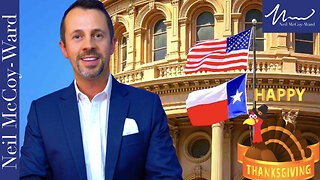Premium Only Content

What’s Wrong With The British Establishment?
The trend in the U.K., towards an increasingly censorious elite only really hit home thanks to a dispute that erupted in July between a venerable bank and Nigel Farage. Under CEO Dame Alison Rose, Coutts Bank attempted to deny him banking services on account of his political views. Despite breaking a cardinal rule and divulging information about a client, the CEO’s refusal to quit had the backing of her board and it seems many in the British Treasury. Corporate culture in 2023 can tolerate failure or slack performance if ideologically sound and it was only the government that forced her out. The outcry in many quarters about the ‘debunking’ of Farage did not extend to much of the Left which was relaxed about the new-found moralizing role of corporate moguls.
The astonishing switch of the elite towards being didactic, and indeed highly ideological and restrictive if not coercive, should be seen as consequences of profound shifts in state and society. How did this happen? What is the likely outcome?
The historian Alan Taylor called the network of people and institutions with power and influence who rule the country ‘the Establishment’. From the establishment in 1688 of a limited monarchy increasingly subordinate to parliament onward to the recent past, the networks of power comprising the ruling elite have extolled pragmatism and favoured neutrality over ideological impositions. Bourgeoisie political revolutions and religious wars were seen as un-English or at least as afflictions that Britain (after the 1707 Union of England and Scotland) had overcome.
Britain’s good fortune resulted in a self-restraining elite, distrusting of ideological agendas and valuing a spirit of compromise. British political and legal culture evolved to produce a society in which the state and the individual enjoyed parity of esteem.
But in stages after 1945, a radically different perspective gained ground. British decision- makers became unnerved by post-war setbacks, Suez, economic stagnation, industrial strife, chronic unrest in Northern Ireland. This led, in 1973, to the momentous decision to join what became the European Union. Not least, it involved subsuming British laws with those in the EU that essentially sprang from a centralizing French tradition.
A bureaucratic and increasingly left-leaning intelligentsia shaped the expansion of EU power. The past fifty years have seen different visionary projects that require endorsement, Net Zero being the key one. Not just on climate issues but increasingly on health matters, an outsourcing of policy to technocratic and supranational bodies has occurred. In what has rapidly become a post-national elite, validation from thrusting global bodies is seen as more important than recognition from the British monarchy.
Simultaneously, Britain has seen a rigid ‘social justice’ orthodoxy become entrenched in private and public organisations & institutions across society. The quasi-religious certainty fueling this top-down crusade has allowed surveillance, cancellation and other forms of social and economic punishment to become permissible.
Eminent historian Professor Gallagher will explore the causes of this change and the implications for the U.K. and others moving forward.
Tom Gallagher is a Scot who pursued an academic career as a historian in England for over three decades and is currently an Emeritus Professor of Politics at the University of Bradford. He lives in the Lake District and travels widely in Europe and further afield.
He mainly taught and wrote about the disruptive impact of identity politics in state and society, particularly in the British Isles and Central and South-Eastern Europe. For at least the last decade, he has commented regularly about attempts to break up the United Kingdom and the unexpected encouragement for secessionist movements sometimes visible at the heart of the British state. His latest book is Europe’s Leadership Famine: Portraits of Defiance and Decay, which appeared in June. He has published 15 single-authored books.
Music Info:
Flying and Uplifting - No Copyright Background Music by LesFreeMusic.
Music Link: • Flying and Uplift...
Outro Music by Coma-Media from Pixaba
-
 5:14:10
5:14:10
GamingChad
11 hours agoMS Flight Simulator 2024 - Lets Make this Turkey Fly -Career mode Pt.2
91.8K7 -
 5:00:01
5:00:01
Pepkilla
12 hours agoHappy Thanksgiving ~ Wumble StwEeeem
56.1K5 -
 7:24:25
7:24:25
Rotella Games
1 day agoThanksgiving Side Missions & Hangout | GTA San Andreas
67.9K6 -
 4:07:31
4:07:31
MafiaTwin
10 hours agoFrist Stream On Rumble
49.4K1 -
 19:41
19:41
Neil McCoy-Ward
14 hours agoFinally! Some Good News Today... (& Happy Thanksgiving!)
34.4K19 -
 7:22:11
7:22:11
tacetmort3m
15 hours ago🔴 LIVE - (HAPPY THANKSGIVING!) BACK WITH MORE STALKER ACTION - STALKER 2 - PART 7
27.8K -
 58:05
58:05
The Tom Renz Show
10 hours agoThanksgiving In America 2024 - With Mark Sherwood
22.7K4 -
 1:13:41
1:13:41
DDayCobra
13 hours ago $9.08 earnedHappy Thanksgiving!
49.3K4 -
 42:24
42:24
Professor Nez
12 hours ago🚨Kamala's Staff CONFESSES to FRAUD! Trump is Already MAKING AMERICA GREAT AGAIN! 🇺🇸
81.1K183 -
 5:12:17
5:12:17
Akademiks
15 hours agoDrake Sues Universal Music Group over Kendrick Lamar 'Not Like Us' again!! Diddy Denied Bail!
92.7K14